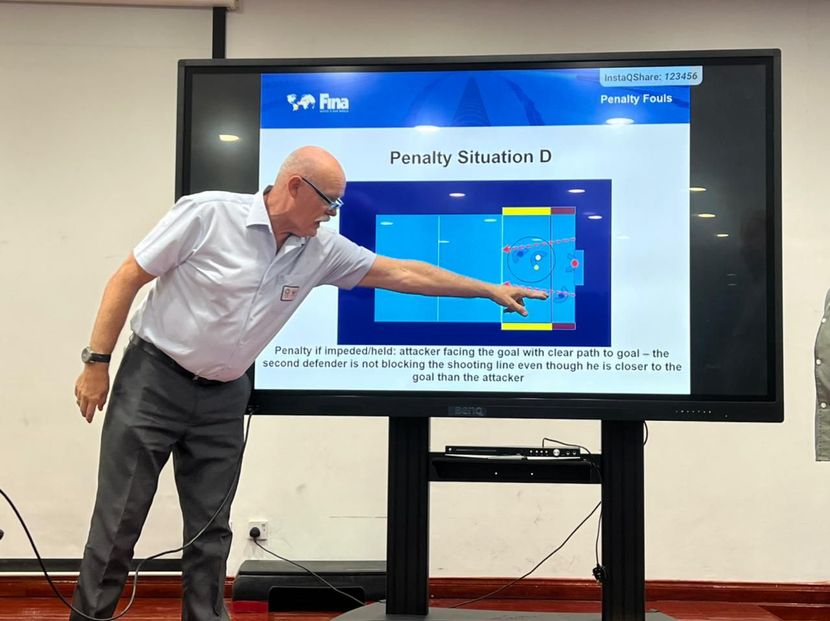
Water Polo referee development is always at the forefront of FINA officials to ensure the best possible officiating is undertaken at all levels. The Covid-19 pandemic is making that task a challenge, to the extent that there may be fewer global schools in the first quarter of 2022.
Despite the pandemic, water polo referees are honing their skills as FINA Technical Water Polo Committee officials conduct schools around the globe.
TWPC Secretary Wim Keman said in 2021 certification schools had been staged in Switzerland, Kuwait and the United States of America. A development school was also staged in Austria.
“We have been trying to do stuff online, but it’s very difficult when it comes to doing exams,” he said.
“Covid has been a huge restriction on the development of referees’ education. In 2021, we had only four compared to 2019 when we had nine certification schools and 11 development schools,” Keman noted.
Although the schools are strongly led by TWPC Vice-Chairman Mark Koganov and Secretary Keman (pictured below) — both long-term elite referees in their time — it is interesting to mention there are 10-12 lecturers doing the schools in a regular year.
“A lot of people are involved in this, including TWPC members Gus Pinker, Ken Kuroda and Bill Shaw, along with senior referees Boris Margeta, George Stavridis and Dion Willis, to name a few,” said Keman.
"Complying with the FINA Covid Protocol, including social distancing requirements, the face-to-face schools have to be limited to a maximum of 20 participants. This is to gain the security we need. That is one of the things we have to deal with at this moment."
“At the beginning of last year we did a couple of online courses, but discussion was disadvantaged with a lot of people behind screens. In face-to-face schools, we handle topics and we discuss issues with video clips from recent tournaments. We try to do it with examples as recent as possible — possibly only up to a year old.
“These may include topics like exclusions, penalties, impeding, etc. We discuss sometimes 40-50 examples per topic. If you have to do this online — also depending on the speed of the internet — sometimes people who follow in some countries do not see it at the right speed. This is very difficult. Everybody is really in favour of face-to-face schools,” Keman said.
"There are also travel restrictions and restrictions in different parts of the world, so it’s very complicated at this moment.”
Technical workshops are held before every major tournament and in 2021 this meant they were held at the two Olympic Games Qualification Tournaments, two World League Super Finals, the Olympic Games and two youth world championships, plus the Challengers’ Cup.
“Before all these competitions we had technical workshops. Not full schools, but with the latest interpretations and instructions, including the operation protocol for the VAR (Video Assistant Referee). This was done in the technical workshops and served its purpose very well, also as refreshment for the attending referees and delegates.”
“During last year, an online course was launched in close cooperation with the FINA Development Department — now it has become a prerequisite test. We want everyone, who is not a FINA referee yet, to either go to a FINA development school and get certificated, or when living in a remote area and it’s difficult to go to a development school, to do the online prerequisite test.
“There are examination questions after each module. This will guarantee more or less that all participants have a similar entry level and a basic knowledge of English. It is a very good platform.”
This online learning programme, developed by the FINA Development Department in collaboration with the TWPC, includes interactive diagrams, videos, and activities to expose the sport to a new generation of participants, including parents and fans.
The programme is available in two versions — those needing to attain the development level referee certificate to join the international referee pathway, will register and undertake an online assessment; for those just wanting to understand more about the rules can complete a version with all the information but without assessment.
This can be accessed by Learning Open Courses | FINA Learning Platform
“There are a lot of people looking at that course,” Keman said.
“The fact that many schools were postponed or cancelled by local health authorities due to obvious reasons caused by the Covid-19 pandemic, resulted in limited options and a frustrating situation for both the TWPC as well as the water polo referees’ families," Keman said. "Also, at this moment we are facing increasing numbers of infections in many parts of the world. As I mentioned before, it will be very challenging to find possibilities to organise face-to-face schools in the next few months.”
However, all is not lost. “If a request comes in at the FINA office, we always see what can be done, Keman added. "Sometimes you make some planning, but then you have to postpone; unfortunately, this has been the case for too many schools.
"We need to go to short-time planning when options are available to organise schools in certain countries. Good examples were the three schools that were organised in the last quarter of 2021. All were organised at short term with good coordination between the FINA Development Department, hosting Federation and TWPC, Keman added. "The last school was on December 17-19 in the USA last year, where we had an attendance of referees with seven different nationalities. Now less than three weeks later, it would not be an option to organise a school in the USA with the current daily infection numbers."
Added Keman: “We have to adjust to the given situations; sometimes it’s very unsatisfactory and frustrating, but when we keep looking for options and with the cooperation from all stakeholders, solutions will be found to continue with the education programme for water polo referees.”